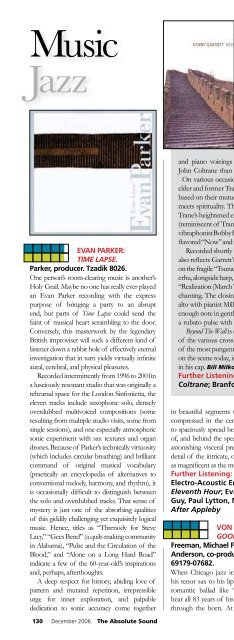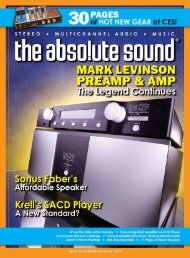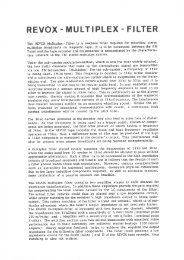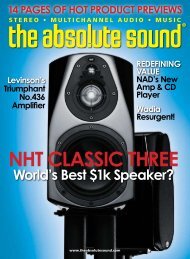Create successful ePaper yourself
Turn your PDF publications into a flip-book with our unique Google optimized e-Paper software.
Music<br />
Jazz<br />
Evan Parker:<br />
Time Lapse.<br />
Parker, producer. Tzadik 8026.<br />
One person’s room-clearing music is another’s<br />
Holy Grail. Maybe no one has really ever played<br />
an Evan Parker recording with the express<br />
purpose of bringing a party to an abrupt<br />
end, but parts of Time Lapse could send the<br />
faint of musical heart scrambling to the door.<br />
Conversely, this masterwork by the legendary<br />
British improviser will suck a different kind of<br />
listener down a rabbit hole of effectively eternal<br />
investigation that in turn yields virtually infinite<br />
aural, cerebral, and physical pleasures.<br />
Recorded intermittently from 1996 to 2001in<br />
a lusciously resonant studio that was originally a<br />
rehearsal space for the London Sinfonietta, the<br />
eleven tracks include saxophone solo, densely<br />
overdubbed multivoiced compositions (some<br />
resulting from multiple studio visits, some from<br />
single sessions), and one especially atmospheric<br />
sonic experiment with sax textures and organ<br />
drones. Because of Parker’s technically virtuosity<br />
(which includes circular breathing) and brilliant<br />
command of original musical vocabulary<br />
(practically an encyclopedia of alternatives to<br />
conventional melody, harmony, and rhythm), it<br />
is occasionally difficult to distinguish between<br />
the solo and overdubbed tracks. That sense of<br />
mystery is just one of the absorbing qualities<br />
of this giddily challenging yet exquisitely logical<br />
music. Hence, titles as “Threnody for Steve<br />
Lacy,” “Gees Bend” (a quilt-making community<br />
in Alabama), “Pulse and the Circulation of the<br />
Blood,” and “Alone on a Long Hard Road”<br />
indicate a few of the 60-year-old’s inspirations<br />
and, perhaps, afterthoughts.<br />
A deep respect for history, abiding love of<br />
pattern and mutated repetition, irrepressible<br />
urge for inner exploration, and palpable<br />
dedication to sonic accuracy come together<br />
Kenny Garrett:<br />
Beyond The Wall.<br />
Steven Epstein and Garrett, producers.<br />
Nonesuch 79933.<br />
From the opening salvo on “Calling,” an<br />
imposing fanfare that kicks off an intense modal<br />
investigation, it’s clear that alto saxophonistcomposer<br />
Kenny Garrett is delving into deep<br />
waters. With its allusions to Africa and the overall<br />
sense of searching inherent in the music, along<br />
with the presence of tenor-sax legend Pharoah<br />
Sanders, the marvelous Elvin-esque drumming<br />
of Brian Blade, and the McCoy-like droning<br />
and piano voicings of Mulgrew Miller, this recording may indeed be closer in spirit to<br />
John Coltrane than Garrett’s acclaimed 1996 homage, Pursuance: The Music of John Coltrane.<br />
On various occasions over the past few years, Garrett has shared the bandstand with jazz<br />
elder and former Trane sideman Sanders. Together they have developed a kindred relationship<br />
based on their mutual desire for pushing the envelope and seeking a place where high energy<br />
meets spirituality. Their inspired chemistry is in full effect on the burning title track (recalling<br />
Trane’s heightened excursions on uptempo vehicles like “Mr. P.C.”) and the droning “Gwoka”<br />
(reminiscent of Trane’s “India”). Garrett’s other mentor on this exploratory session is the great<br />
vibraphonist Bobby Hutcherson, prominently featured on the McCoy-ish “Qing Wen,” the Latinflavored<br />
“Now” and the affecting vocal number “Kiss To The Skies,” buoyed by a six-voice choir.<br />
Recorded shortly after his first eye-opening trip to mainland China last year, Beyond The Wall<br />
also reflects Garrett’s fascination with the country’s culture, music, and spirituality, particularly<br />
on the fragile “Tsunami Song,” which features Guowei Wang on the keening two-string Chinese<br />
erhu, alongside harp, cello, and violin. Garrett also strikes an evocative and highly original note on<br />
“Realization (March Towards The Light),” underscored by a hypnotic sample of Tibetan Monks<br />
chanting. The closing “May Peace Be Upon Them” is a stirring quartet vehicle for Garrett’s<br />
alto with pianist Miller, drummer Blade, and bassist Robert Hurst III. It opens on a soothing<br />
enough note in gentle waltz-time fashion, but gradually builds to a frantic, sanctified peak over<br />
a rubato pulse with Kenny digging deep and throwing torrents of notes around the room.<br />
Beyond The Wall is distinguished by particularly good drum sound, as well as clear separation<br />
of the various cross-cultural elements that converge in the mix. Garrett, who possesses one<br />
of the most pungent tones along with the most commanding technique of any alto-sax player<br />
on the scene today, is relentless in his pursuit of excellence. This project is yet another feather<br />
in his cap. Bill Milkowski<br />
Further Listening: Kenny Garrett: Pursuance: The Music of John<br />
Coltrane; Branford Marsalis: The Footsteps of Our Fathers<br />
in beautiful segments that range from tightly<br />
compressed in the center of the soundstage<br />
to spaciously spread between, beyond, in front<br />
of, and behind the speakers. Saxophones have<br />
astonishing visceral presence, and the realistic<br />
detail of the intricate, often teeming timbres is<br />
as magnificent as the music. DR<br />
Further Listening: Evan Parker<br />
Electro-Acoustic Ensemble: The<br />
Eleventh Hour; Evan Parker, Barry<br />
Guy, Paul Lytton, Marilyn Crispell:<br />
After Appleby<br />
Von Freeman:<br />
Good Forever.<br />
Freeman, Michael Freidman, Jim<br />
Anderson, co-producers. Premonition<br />
69179-07682.<br />
When Chicago jazz icon Von Freeman puts<br />
his tenor sax to his lips and blows on a lush,<br />
romantic ballad like “Didn’t We,” you can<br />
hear all 83 years of his life experience passing<br />
through the horn. At first the breathy tone<br />
may recall Ben Webster, or maybe a young<br />
modern-day upstart like tenor terror James<br />
Carter in full Websterian mode. But then,<br />
being Von Freeman, he can’t control his<br />
subversive instincts. Invariably, in the middle<br />
of a sensitive solo, he’ll get frisky and veer<br />
off the straight and narrow. The intonation<br />
will head into Albert Ayler territory just a bit,<br />
130 December 2006 The Absolute Sound










